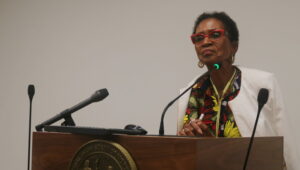
Gov. Roy Cooper vetoed House Bill 237, which placed regulations on masks, limited protester conduct and changed campaign donation law.
HB 237, a sweeping and wide-ranging piece of legislation, stirred controversy in North Carolina with its proposed consequences for wearing masks in public and obstructing traffic during protests, as well as its loosening of rules regarding funding for political campaigns. The bill originally emerged in response to a recent increase in protests on college campuses.
On June 22, Cooper vetoed it, saying in a statement that the legislation, “removes protections and threatens criminal charges for people who want to protect their health by wearing a mask.”
But in a post on X, North Carolina Speaker of the House Tim Moore, a Republican representing Cleveland and Rutherford counties, said the North Carolina House of Representatives, where Republicans hold a super majority, would overturn the governor’s veto.
Other opponents of the bill — including North Carolina House Democrats, the ACLU of North Carolina and the NAACP North Carolina State Conference — have said that it removes a safeguard for many people’s health, especially those with weakened immune systems.
Proponents of the bill, on the other hand, argue that safety-concerned citizens have nothing to fear. The bill does allow masks “for the purpose of preventing the spread of contagious disease,” as long as they are “medical or surgical grade.”
“We’re trying to find a way to ensure public safety, to protect law-abiding citizens from criminals who would shield their identity and at the same time, protect someone who wants to protect their health,” Moore said in an interview with ABC 11.
But officials from North Carolina’s Department of Health and Human Services voiced concerns about the bill’s possible impacts on public safety. According to WECT 6 News, the department said to lawmakers that, as it stands, the bill could make those who require masks more reluctant to use them and more likely to be harassed. According to Port City Daily, Republican State Sen. Buck Newton, who represents Greene, Wayne and Wilson counties and who presented the bill, said to other Senate members while presenting the bill that he trusts law enforcement to use “common sense” when checking individuals wearing masks. A recent amendment to the bill allows masks for health purposes.
But not everyone agreed.
“I voted against this bill because it wasn’t just a mask, it was the fact that you’re trying to silence our voices,” said Rep. Renée Price during a press conference regarding the bill. She also said that the bill will affect the younger generations the most. Price, a Democrat, represents the counties of Caswell and Orange.
In Price’s estimation, HB 237 would pose a significant danger to the flow of money into the state, if adopted.
“I even got emails from people from outside of North Carolina saying that they were going to boycott North Carolina because of this law, which therefore would have meant detriment to our economy because we rely on tourism,” Price said.
“They have young people that are concerned and expressing your views and older people that are trying to quash your voice. That is a problem.”

Meanwhile, a college student protester who requested anonymity due to fear of retaliation said the bill is “a violation of freedom of speech, as it removes the ability for citizens of the United States to freely express themselves in their own country.”
Specifically, HB 237 mandates fines or potential imprisonment for people who block the passage of cars on a public road in the course of a protest or for hampering an emergency vehicle.
“As college students, it is not a crime to want to protect one’s quality of life and future,” the student protester said.
An additional section of the bill affects campaign finance laws by weakening restrictions on political contributions, allowing unlimited donations and the possibility of anonymous donors, according to WECT 6 News.
Republicans said the provision is in response to past legislation that allegedly allowed Democrats to raise more money than them, and that these new provisions only create balance, according to the John Locke Foundation.
But Cooper didn’t see it that way.
“This legislation creates a gaping loophole for secret, unlimited campaign money,” he said in his veto statement. “While voters are kept in the dark, this scheme allows anonymous out-of-state billionaires to flood North Carolina with campaign contributions to rescue extreme right-wing candidates that Republicans now fear will lose.”


